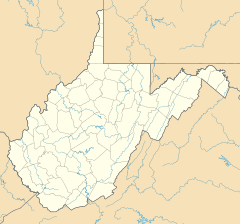Blocton, West Virginia facts for kids
Quick facts for kids
Blocton
|
|
|---|---|
| Country | United States |
| State | West Virginia |
| County | Mingo |
| Elevation | 636 ft (194 m) |
| Time zone | UTC-5 (Eastern (EST)) |
| • Summer (DST) | UTC-4 (EDT) |
| FIPS code | 1553926 |
Blocton is a small, quiet place in Mingo County, West Virginia, United States. It is known as an unincorporated community, which means it doesn't have its own local government like a city or town. Instead, it's managed by the county. Blocton is mostly deserted today, and its post office is no longer open.
Contents
Understanding Unincorporated Communities
An unincorporated community is a settlement that is not part of an official city or town. It doesn't have its own mayor or city council. Services like roads, police, and fire protection are usually provided by the county government. Many small communities, especially in rural areas, are unincorporated.
How Unincorporated Communities Form
These communities often grow around a specific industry, like a factory or a mine. People move there for work, and homes and businesses appear. If the industry declines, people might leave, and the community can become very small or even deserted.
Blocton's Location in West Virginia
Blocton is located in the southwestern part of West Virginia. This region is known for its mountains and valleys. It is also famous for its history of coal mining. Mingo County, where Blocton is found, is part of the Appalachian Mountains region.
Geography of Mingo County
Mingo County has a rugged landscape with many hills and rivers. The Tug Fork River forms part of its border. The area's geography played a big role in the development of coal mining. The mountains held rich coal deposits, making mining a major industry.
Blocton's History as a Coal Town
Blocton was once a busy coal town. Many communities in West Virginia grew because of the coal industry. Companies would build towns near their mines to house workers and their families. These towns were often called "company towns."
Life in a Company Coal Town
In a company town, the mining company often owned everything. This included the houses, the general store, and even the school. Miners and their families lived and worked in these towns. Life could be tough, but it also created strong communities. People relied on each other.
The Rise of Coal Mining
Coal mining became very important in the late 1800s and early 1900s. Coal was needed to power factories, trains, and homes. This demand led to a boom in mining, and many new towns like Blocton were established.
The Decline of Coal
Over time, the demand for coal changed. Other energy sources, like oil and natural gas, became more popular. New mining methods also meant fewer workers were needed. As mines closed, people moved away to find new jobs. This is why many coal towns, including Blocton, became deserted.
Why Some Communities Become Deserted
Blocton is an example of a "ghost town" or a deserted community. This happens when the main reason for a town's existence disappears. For Blocton, it was the decline of coal mining.
Economic Changes
When a town's main industry shuts down, jobs disappear. People have to leave to find work elsewhere. This can lead to a rapid decrease in population. Businesses close, and eventually, the town becomes empty.
Environmental Factors
Sometimes, natural disasters or changes in the environment can also cause a town to be deserted. However, for coal towns like Blocton, economic changes were the primary reason.
Blocton Today
Today, Blocton stands as a quiet reminder of West Virginia's coal mining past. While it may be deserted, it tells an important story about how industries shape communities. It shows how towns can grow and shrink based on economic changes.
See also
 In Spanish: Blocton (Virginia Occidental) para niños
In Spanish: Blocton (Virginia Occidental) para niños


